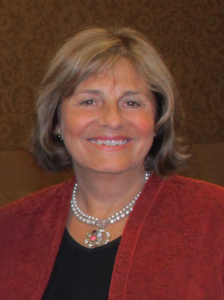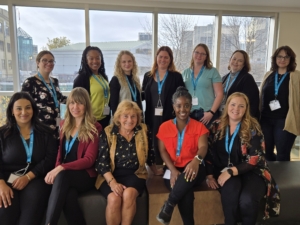November 15, 2024
A first-of-its-kind conference in Manitoba saw health-care providers from across the province gather to talk and learn about a difficult topic, with support from St. Boniface Hospital Foundation donors.
The Manitoba Pregnancy and Infant Loss Conference was held October 24 and 25 at Winnipeg’s Inn at the Forks. The Hospital’s Obstetrics, Gynecology & Neonatology (OGN) Program hosted the conference, in co-operation with Women’s Health Clinic and Health Sciences Centre Winnipeg.
The conference welcomed roughly 80 attendees representing almost all of Manitoba’s regional health authorities. They included nurses, physicians, doulas, community support workers, social workers, counsellors, midwives, spiritual health workers, psychologists, and health-care managers.
“We all want to have more openness around this topic,” said Chloe Shindruk, speaking before the conference. Shindruk is a Clinical Nurse Specialist in the OGN Program and Chair of the conference planning committee at St. Boniface Hospital. “Our aim was to support health-care providers, equip them with best practices and tools they need to provide the most compassionate care possible, and to share knowledge.”
As many as one in five pregnancies end in loss, according to Statistics Canada. That number is significant, said Shindruk. “Anticipating or experiencing pregnancy loss or the death of an infant is more common than is understood, colloquially,” she said.
Loss traumatic for families

Sherokee Ilse, a renowned international speaker, trainer, and author based in Tucson, Arizona, facilitated discussions and panels at the conference, and delivered the keynote address. Ilse is also a consultant, parent advocate, and bereaved parent herself.
“When a baby dies, there’s nothing small about it,” said Ilse, on the phone from Tucson before the conference. “It’s huge for families,” she continued. “It’s not just the size of the baby or how long they’ve been pregnant; it’s the future the parents have created in their hearts and minds. This is traumatic and extremely emotional for most families.”
“Death…does not define these babies. Love does.”
“This isn’t only about the death of the baby; this is about the birth, life, and love of a baby. Death, or problems the baby has, do not define these babies. Love does. When parents hear this, it frees them up to love on their baby and not be afraid, as well as make better decisions based on love. Health-care providers can learn so much from the lips and the hearts of those who have lived it,” she said.
Ilse supports bereaved parents at clinics and hospitals in Arizona, almost from the moment they receive the news. “I tell parents, this is a love story. You love your baby, then you make decisions going forward based on love, not based on fear,” she said. “Make every decision and choice based on that love, and you will minimize most regrets and maximize the memories which will provide comfort over time.”
Health-care providers in Manitoba still have a lot of work to do, in terms of understanding the needs of families, explained Shindruk. “We ask ourselves, on several fronts, how do we weave in a holistic, family-centred approach that considers all the dimensions of the loss experience?”
“Some folks do this type of care incredibly well, but it is often behind closed doors. The conference will give them a chance to talk about their experiences and to learn with and from one another,” she said.
Bereaved parents and family members were also invited to speak at the conference. “We wanted to hear what went well with their care, and what opportunities were missed. What are those unmet needs that we can address? How can we rise to the challenge? We designed this conference to peel back the curtain and learn more deeply,” said Shindruk.
Parents need to meet, hold and love on the child they have created

In cases of pregnancy and infant loss, health-care providers only get one chance to respond in the right way, and parents only get one chance to parent their baby. There are no do-overs, said Ilse. “Providers have an opportunity, and a responsibility, to do their best to ensure the families get the most amazing, sky’s-the-limit care.”
Health-care providers often make the mistake of thinking they can protect parents, she said.
“If their attitude is to ‘fix’ things, they will learn from we parents that this is impossible to do. It can demean our experiences where there is a natural need to be the parent, feel the love and pain, and work through this with intention.”
“When providers do most things for the baby like bathe, diaper, dress, snip the hair…I ask them, ‘Who is parenting the baby: you, or the parents?’ In trying to help, they may be cheating them from the only opportunity they have to create parenting memories. This is often a ‘light bulb’ moment when they realize this kind habit may actually be harmful.” “Parents need to meet their baby, and incorporate their baby into their family, before they say a beautiful goodbye,” she added. “What they need is for someone to treat them like parents who have had a child.”
Overwhelmingly, health-care providers want to understand the family experience, be it positive or negative, explained Shindruk.
“We are really trying to connect dots along the silos of care. Families who experience loss cross several health-care provider interactions and programs. How do we understand what each other are doing? What are the different approaches? We want to have a better understanding across the care trajectory,” she said.
Conference opened up dialogue
Creating memories for families should be the top priority after a loss, said Ilse. She advocates for parents to diaper, bathe, and dress their baby.
“Sing ‘Happy Birthday,’ have a cake, involve their other children, and have some private time as a family. All of that creates their story more intentionally, so the family has something to remember, talk about, and cherish,” she said.
“Conferences like this are helpful. We are opening up the dialogue and giving health-care providers practical suggestions for how to be present and intentional with families. We need to strive to always be checking in with these families, listening to them, and enhancing our care.”
“It all makes perfect sense, but it’s such a hard thing for people because babies aren’t supposed to die.”


